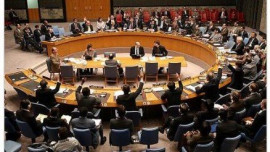1726645927-0/BeFunk_§-(21)1726645927-0.jpg)
Bangladesh’s interim government has granted magisterial powers to the army for a period of two months, as part of a broader effort to restore law and order following recent political unrest.
The decision, which took effect immediately on Tuesday, aims to counter "subversive acts" and improve stability, particularly in industrial areas, according to a notification from the Ministry of Public Administration.
Commissioned officers of the Bangladesh Army will now have judicial authority under Section 17 of the Code of Criminal Procedure (CrPC).
This temporary power places army officers as special executive magistrates, subordinate to district magistrates or deputy commissioners.
The officers are authorized to arrest individuals, disperse unlawful gatherings, and use force, including opening fire, in cases of self-defense or extreme necessity, according to the order.
This development comes after a student-led uprising on August 5, which led to widespread violence and the ousting of Prime Minister Sheikh Hasina. Since then, Bangladesh has been grappling with a volatile law and order situation.
The uprising resulted in the looting of 5,829 firearms and over 600,000 rounds of ammunition from police stations, prompting the government to launch joint recovery operations involving the army, police, and elite forces.
However, a significant portion of these weapons has yet to be recovered.
The unrest has also disrupted the police force. As of Tuesday, 187 police officers had not returned to duty since the transitional government, led by Muhammad Yunus, took office on August 8.
This has led to a lack of police presence on the streets, including in the capital, Dhaka, where traffic control and general security have been compromised.
At least three political figures have died in custody following the government’s crackdown, with accusations of torture surfacing, though the authorities have denied these claims.
Law Adviser Asif Nazrul defended the decision, stating that the army’s involvement was necessary to counter the ongoing instability. “We are witnessing subversive acts and disrupted stability across the country,” he said, adding that he believed army personnel would not misuse their powers.
While some officials, including former secretary Abu Alam Mohammad Shahid Khan, view the move as necessary, others have raised concerns.
Veteran lawyer ZI Khan Panna criticized the decision, arguing that granting judicial powers to army personnel reflects a loss of confidence in the country’s civil magistrates and risks damaging the relationship between the military and the public.
The new measures are part of the Yunus administration's broader strategy to restore law and order and recover looted firearms and ammunition, as the country navigates a tense post-uprising atmosphere.
The temporary powers will remain in effect for 60 days, after which the situation will be re-evaluated.


1726499412-0/luke-thompsan-and--(1)1726499412-0-165x106.webp)









1726396442-0/cover_1726380627FotoJet-(13)1726396442-0-270x192.webp)

1726645904-0/Express-Tribune-Web-(3)1726645904-0-270x192.webp)




COMMENTS
Comments are moderated and generally will be posted if they are on-topic and not abusive.
For more information, please see our Comments FAQ